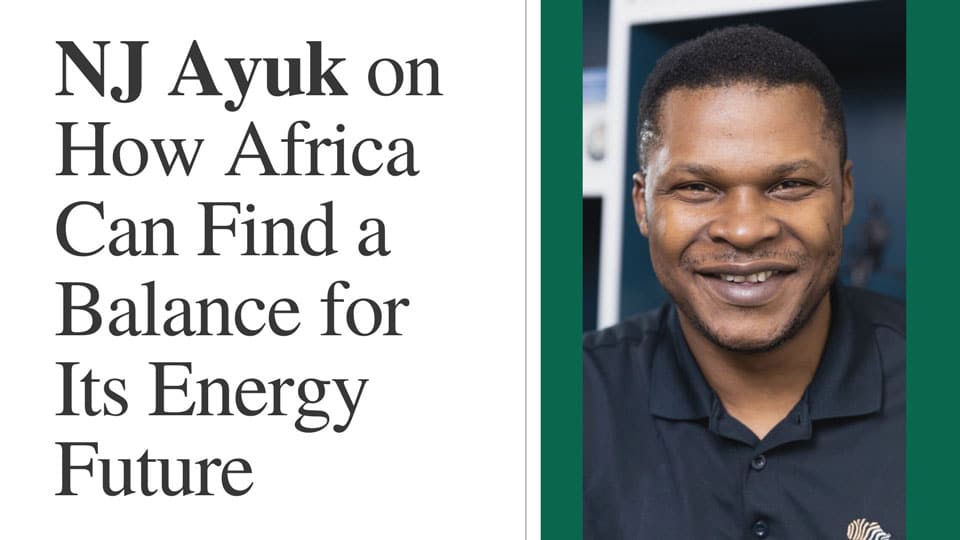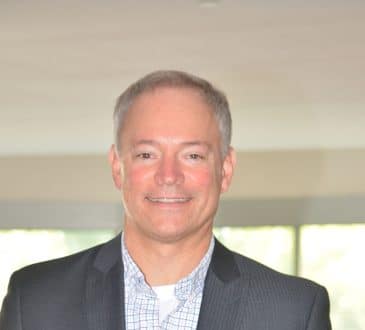NJ Ayuk on How Africa Can Find a Balance for Its Energy Future

As the world continues to weigh its demands for energy against the creeping realities of man-made climate change, Africa has been thrust into a precarious situation, according to energy expert NJ Ayuk.
Across the globe, wealthy nations are constantly devouring more fossil fuels like coal and oil while simultaneously pushing incentives to make renewable options more affordable and enticing. However, many countries in Africa are struggling to keep the lights on.
The question before NJ Ayuk, the most prominent energy lawyer on the continent and founder of the globally recognized Centurion Law Group, is how to balance energy needs for millions of Africans who currently lack access to electricity or rely on spotty infrastructure against the global outcry for cleaner options.
The gravity of the situation isn’t lost on him.
“We live in a world where climate change is one of the biggest challenges of our generation and our time,” said NJ Ayuk, who also serves as executive chairman of the African Energy Chamber. I think our challenge would have to be building climate change and [fighting] energy poverty at the same time.”
Because of the differences in access and natural resources, the debate around energy policies and production in Africa will necessarily be different from places like the United States and Europe, he said. But that doesn’t mean that Africa should disregard the environmental impact of fossil fuels.
“I think there is a very Western misconception about the needs of everyday people in Africa,” NJ Ayuk explained. “In the West, the dialogue can sound like, ‘We want to save the planet, we want to save the planet’ — which, of course, we all want to do. But climate change and energy poverty are two sides of the same coin. We have to do both. We have to end energy poverty while also moving forward with technology and policies that can ensure that we’re moving in the right direction for sustainability.”
The good news, NJ Ayuk said, is that many countries in Africa have an opportunity to address multiple needs at once. He promotes policies that not only increase access to energy across the continent, but also address the broader social good at the same time.
“We don’t need simply an energy transition that brings more power to more people,” he said. “It has to be a just energy transition, where we see African women being part of that.”
The focus on African women is crucial for development, according to NJ Ayuk. Centering women is central to his efforts to raise as many Africans out of poverty as possible. Recent studies have shown that when women work and receive equal wages, their families enjoy more significant benefits.
Carving out a space for women in the energy industry also serves as a way to engage more of the population and inspire the next generation of African workers, NJ Ayuk said.
“Because wherever we come from, whether it is oil or natural gas, African women have been the last hire. They’ve been kept behind. And they have not really had opportunities to really drive new things. A lot of financing that is going in, even in the clean energy industry, African women are still receiving less than 2% of that, and nobody’s really raising that rate. We are always hush-hush about that.”
When women have greater access to capital, they become a political force — one that may have the power to reshape governance in a way that directly benefits families, he added. He pointed to the United States as part of his inspiration.
“What I want to see in Africa, and what I learned in my American sojourn, is to really look at Africa and say, ‘Why do we have about 10 to 15 states without sexual harassment laws that would really protect women at work?’ Because we’ve just been stuck on the environmental issue only. We’re not looking at the social and the governance aspects,” he said.
“We’re not really seeing this social change, so how can we be that change that we want to see?” he added. “When you really look at it, and you look at where we are going, people are saying, ‘Let’s abandon natural gas and just focus on transitioning to renewables.’ But what are you going to transition from? From the dark to the dark? You need to have something, then you transition. Africa’s greenhouse gas emissions are 2.73% [of the global total]. They’re not even up to 3%. So for places like Europe or the United States that are somewhere in the 20s or the 30s, they need to decarbonize and they need to decarbonize fast. And Africa needs to be given a chance to industrialize. But Africa needs to get its act together. We need to cut corruption and cut out mismanagement. That’s what I’m focused on.”
Have you read?
Pinduoduo Inc Changes Name to PDD Holdings Inc.
Truth Coaching with Randy Howell Jr. Has the Power to Heal.
Advice for M&A success in 2023 by Josh Rogers.
Ever Heard of ChatGPT for Executives? Better Update Your Resume by Rick Andrade.
5 Opportunities Every Leaders Should Be Embracing in 2023 by Gordon Tredgold.
The Future of Work: Going Beyond the Surface Level Issues by Joshua Berry.
Bring the best of the CEOWORLD magazine's global journalism to audiences in the United States and around the world. - Add CEOWORLD magazine to your Google News feed.
Follow CEOWORLD magazine headlines on: Google News, LinkedIn, Twitter, and Facebook.
Copyright 2025 The CEOWORLD magazine. All rights reserved. This material (and any extract from it) must not be copied, redistributed or placed on any website, without CEOWORLD magazine' prior written consent. For media queries, please contact: info@ceoworld.biz








